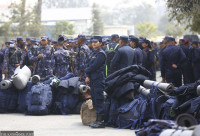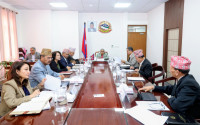National
Meta ignores deadline. Nepal undecided
Government says expert study ongoing to weigh pros and cons of social media before deciding on next steps.
Aarati Ray
Nine days after Minister for Communication and Information Technology Prithvi Subba Gurung warned American tech giant Meta of a nationwide ban for failing to register in the country, no such action has followed. But the tension remains.
Citizens and civil society are uncertain about the future of Meta-owned social media platforms in Nepal.
On April 25, Minister Gurung issued a seven-day ultimatum to Meta (the parent company of Facebook, Messenger, WhatsApp and Instagram), threatening to block its platforms unless the company registered.
Speaking at a Right to Information interaction hosted by the National Information Commission, Gurung warned of strict enforcement. The deadline passed on May 2 without a ban or any update from the government.
Asked for clarification, Gajendra Kumar Thakur, spokesperson for the ministry, said the matter is under review. “We are conducting a study now. Only after the report comes out can we determine the next steps,” he said.
According to Thakur, the study will assess both the benefits and harms of social media use in Nepal. “Of course, social media cannot be directly banned or shut down… Considering the sensitivity of the issue, a study is being done by an expert to understand the positive aspects, the problems caused by lack of registration, and many other issues users are facing.”
The most recent communication with Meta regarding its registration took place during a virtual meeting on April 17, which was arranged after repeated attempts by the ministry. On the call were Ruzan Sarwar, Meta’s public policy manager for the Asia-Pacific region, other Meta representatives, and Minister Gurung.
But the meeting did not lead to any commitments. “It was not that fruitful,” said Thakur. “They didn’t give us a clear yes or no. Their response was vague, more of a diplomatic, non-committal answer.”
Thakur said Meta representatives indicated they would get back with a response after discussing the issue with their board of directors and managerial committee. “Till now, we haven’t received a response,” Thakur said.
Even before Gurung’s April 25 statement, the ministry had set an April 20 deadline for Meta to register in Nepal.
Nepal’s push for registration stems from its Directives Relating to the Regulation for the Usage of Social Media, 2023.
The directives mandate all social media companies to register with the ministry, appoint a local grievance officer, establish a contact point in Nepal, and assign an oversight official for self-regulation. Companies must also cooperate in criminal investigations, remove illegal content, and comply with Nepali laws.
So far, only TikTok, Viber, and WeChat have been registered in Nepal.
The ministry says Meta’s failure to register has made it difficult for the government to address user complaints on its media platforms.
Lack of formal presence of Meta has indeed created challenges for Nepal’s law enforcement agencies, officials say.
“Not having a point of contact or office of Meta in Nepal does create some problems,” Deepak Raj Awasthi, spokesperson for the Cyber Bureau of Nepal Police, said. “It’s not that they are not helping or not communicating—they are. But it would be easier for us to communicate and collaborate on cases if they had an office here.”
Awasthi emphasised that registration is not enough. What law enforcement needs, he said, is timely cooperation, access to user information, suspect details, and necessary data sharing in tracking suspects.
He also pointed out that social media companies often fail to consider Nepali cybercrime laws, such as those relating to defamation or abusive language. “Their community guidelines may not regard such content as a violation,” said Awasthi.
“We have tons of cases which are stuck or delayed because we don’t get a response. If they were registered here, we would have a strong legal ground and more space for communication.”
However, the government’s hardline approach with repetitive ultimatums on a ban has sparked some criticism.
A network of 31 civil society organisations, including Digital Rights Nepal, Amnesty International Nepal, Freedom Forum, Media Action Nepal, Accountability Lab Nepal and ChildSafeNet, issued a joint press release last Thursday.
The statement called on the government to refrain from “imbalanced, impractical, and premature decisions” that could restrict freedom of expression (Article 17), right to information (Article 27), and digital rights guaranteed by Nepal’s constitution.
“While appropriate legal frameworks are indeed necessary… banning platforms without a transparent process and clear legal standards would be arbitrary and unconstitutional,” the statement said.
The civil society network urged the government to engage in multi-stakeholder dialogue and ensure the accountability of social media platforms that are based on international human rights standards, protect user rights, and hold companies accountable.
Previously, the Asia Internet Coalition (AIC), an industry group that includes Meta, Google, Apple, Amazon, and others, had also criticised Nepal’s directives. In letters sent to the government in 2023 and again in 2024, the AIC described the rules as inconsistent with international norms.
Yet, Parliament is currently reviewing a bill to formalise the directives into law. The bill, registered in the National Assembly, would allow only approved platforms to operate in the country. Non-compliant platforms could face restrictions or complete bans.
But civil society organisations say such restrictive measures risk harming an economy that aspires to be based on information technology services export, and may deter foreign investment in the tech sector.
If information services provided by social media platforms are obstructed, this would broadly affect information dissemination by government agencies through these platforms, as well as communication between families residing within and outside Nepal.
The press statement has also called for social media companies to communicate with the ministry, operate responsibly and adopt necessary transparency while working in Nepal.
As the debate rages on, it’s unclear whether Meta will bend to Nepal’s demands or stand its ground. For now, the ultimatum has lapsed, the ban is on hold, and the government is studying its next move.




 8.4°C Kathmandu
8.4°C Kathmandu














